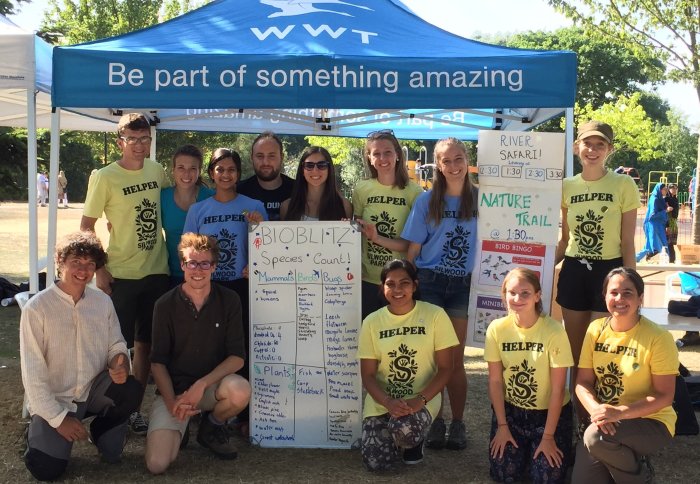Slough residents find a wealth of nature in the heart of their town
by Matilda Dunn

The first ever ‘BioBlitz' at Sough’s PlayDay 2018, led by Silwood Park and the WWT, saw residents counting 46 different species across five taxa.
Staff and students from Imperial College London’s Department of Life Sciences Silwood Park campus teamed up with Slough Borough Council and the Wildfowl and Wetlands Trust (WWT) to run a BioBlitz in Slough’s Salt Hill Park.
We all learnt something new, not just the kids, about nature in our own area. Charmaine Slough resident
The BioBlitz initiative originally began as a way to record all living species within a designated area by carrying out an intensive surveying period over a certain length of time. The events often also have the goal of getting the public interested in nature and biodiversity.
The Slough BioBlitz saw local residents participate in mammal and bird counts, minibeast surveys and river dipping, where they identified 46 different species.
Slough resident Charmaine said: “We had a great time and the kids loved it. River dipping was a first for us all and we want to come back and do it again throughout the holidays! We all learnt something new, not just the kids, about nature in our own area.”
The UK’s disconnect from nature

Since the release of the RSPB’s 2013 'Connection to Nature' report, which found that four out of five children in the UK are classified as “not adequately connected to nature”, increasing evidence has emerged to further demonstrate this worrying trend.
Some of the fundamental barriers to connecting children with nature include a lack of opportunities, from structural barriers such as living in urbanised environments, to social barriers such as fear and risk-aversion behaviours.
This disconnection from nature has been closely linked to a decline in species numbers across the UK, resulting in a call for scientists to start focussing more on sharing their research with younger audiences.
WWT engagement in Slough

The Wildfowl and Wetlands Trust (WWT) are working in partnership with Slough Borough Council, the Environment Agency and Thames Water to deliver the Saving the Salt Hill Stream project in Slough. The project aims to bridge the gap between people in this urban town and the nature that can be found in their own back gardens, through community engagement and the creation of urban wetlands.
Having studied this project and been involved with WWT lead community stream cleans in the area, students from Imperial’s Silwood Park campus decided to team up with the organisation to put together a one-day environmental outreach event.
Students from the Silwood Park campus investigate areas relating to ecology and conservation and are trained in ecological field and surveying techniques. Many have a great passion for nature and the environment and hold expert species knowledge and identification skills.
Bringing the BioBlitz to Salt Hill park
The BioBlitz in Slough primarily aimed to teach children about the local wildlife and increase connectivity to nature through interactive stalls and activities as well as survey and ID walks.

Unlike the Silwood Park campus, which sits in 100 hectares of undisturbed grassland and woodland, wildlife in the heavily industrialised Slough can be less obvious to find. But by bringing together the enthusiasm of the local community and the know-how of the Silwood students, a surprising amount of biodiversity was discovered in this small urban park.
While mammal and bird counts were a little low and predictable (the usual magpies and squirrels were the amongst the count), the ‘River-dipping Safari’ proved to be the biggest success of the day.
Samami, age 9, said: “It was fun to learn about the fish and snails in the stream.”
Children collected 13 different species including a water scorpion, a stickleback fish and even a giant fish leech, which was the most surprising find of the day. Minibeast hunts also proved bountiful with a collection of butterflies and other species including a beautiful wasp spider.
Slough resident Savrita said: “The children really enjoyed the arts and craft stalls and can’t wait to try out their toad houses in the garden at home!”
An annual event
The volunteers found it a rewarding experience to be able to share their knowledge and skills with such an enthusiastic audience.

Tom White, MSc Conservation Science student at Imperial, said: “As environmental scientists, we are lucky enough to see how amazing the natural world is every day and it’s a pleasure to share this with the local community and see children so enthusiastic about this too.”
WWT Saving the Salt Hill Stream Conservation Officer, Claire Hutchinson, said: “Our very first Bioblitz was a fantastic success! People were queuing up to go river dipping and discover the creatures living in the Salt Hill Stream. It was great to see children playing outdoors, something which we aim to encourage. We’re planning to make this an annual event, and WWT look forward to working with Imperial College London in the future.”
The final species count ended with 46 unique species across five taxa, something the residents were surprised and delighted to find in their local area. But with over a hundred newly inspired budding environmentalists, we hope that next year’s BioBlitz in Slough will go on to beat that score and infuse more enthusiasm!
Article text (excluding photos or graphics) © Imperial College London.
Photos and graphics subject to third party copyright used with permission or © Imperial College London.
Reporter
Matilda Dunn
Centre for Environmental Policy